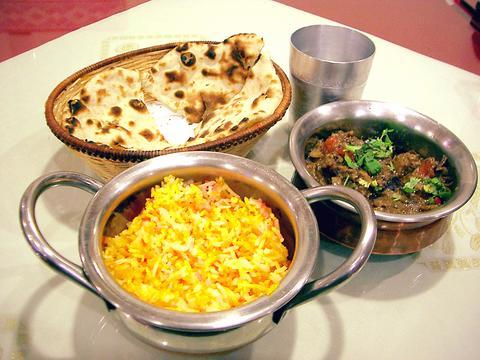A few of Taipei's locally run restaurants can produce a reasonable curry without using ingredients from India, however, the better curries will always be those prepared by a native chef.
Out of India is the latest Indian fare to hit the Taipei market. With less than two months on the scene, people are already queuing up for its homemade curries and tandoori meats. Compared with the other six authentic Indian restaurants in the city, however, there is some question as to how long Out of India will still be in Taipei.

PHOTO: DIANA FREUNDL, TAIPEI TIMES
He has studied Chinese at Shida for the past five years, but the restaurant's owner and chef, Andy, worked in a kitchen in northern India before bringing his Punjabi cuisine to Taiwan. The New Delhi native said he wanted to target the student market by offering reasonably priced Indian meals. His prices are slightly cheaper than those at other eateries and include a lunch time set meal with veggie curry, rice, salad and a drink for NT$150. A large set meal with soup, chicken tikka, curry, rice, butter nan and masala milk tea is also available at lunch and dinner for NT$350.
The most popular items, he said, are those from the clay oven. There is a mixed grill combination of tandoori chicken, mutton, fish and prawns (NT$450). In addition to the usual selection of chicken, mutton and fish curries, masalas and vindaloos are a few specialty dishes such as mutton kadaise (cooked with onion, tomatoes and herbs in a kadai Indian wok) and a Goa style fish curry.
When asked, the waitress said all ingredients were from India, except a local brand of butter used to make the daal. It had such a poignant taste that after eating only a few spoon fulls it was difficult to tell whether or not the others dishes had also used it.
The nan was good, as was the basmati rice, which is used to make the biryani and pulao. Dessert is inexpensive at NT$50 and includes a choice between gulab jamun and Indian sweet yogurt.
There is seating for 24 on the main floor and a basement party room that holds 20 and can be rented out for private functions. Given how fast the restaurant filled up last Sunday (30 minutes after opening and every one arriving around the same time) the service was fast and friendly.
Out of India might not have the best tasting vegetarian curries in Taipei but it definitely has the best decor. The red painted trim and tasteful collection of tapestries on the wall give it a warm ethnic look, but don't quite make up for the substandard daal.

Growing up in a rural, religious community in western Canada, Kyle McCarthy loved hockey, but once he came out at 19, he quit, convinced being openly gay and an active player was untenable. So the 32-year-old says he is “very surprised” by the runaway success of Heated Rivalry, a Canadian-made series about the romance between two closeted gay players in a sport that has historically made gay men feel unwelcome. Ben Baby, the 43-year-old commissioner of the Toronto Gay Hockey Association (TGHA), calls the success of the show — which has catapulted its young lead actors to stardom -- “shocking,” and says

The People’s Republic of China (PRC) invaded Vietnam in 1979, following a year of increasingly tense relations between the two states. Beijing viewed Vietnam’s close relations with Soviet Russia as a threat. One of the pretexts it used was the alleged mistreatment of the ethnic Chinese in Vietnam. Tension between the ethnic Chinese and governments in Vietnam had been ongoing for decades. The French used to play off the Vietnamese against the Chinese as a divide-and-rule strategy. The Saigon government in 1956 compelled all Vietnam-born Chinese to adopt Vietnamese citizenship. It also banned them from 11 trades they had previously

Inside an ordinary-looking townhouse on a narrow road in central Kaohsiung, Tsai A-li (蔡阿李) raised her three children alone for 15 years. As far as the children knew, their father was away working in the US. They were kept in the dark for as long as possible by their mother, for the truth was perhaps too sad and unjust for their young minds to bear. The family home of White Terror victim Ko Chi-hua (柯旗化) is now open to the public. Admission is free and it is just a short walk from the Kaohsiung train station. Walk two blocks south along Jhongshan

Snoop Dogg arrived at Intuit Dome hours before tipoff, long before most fans filled the arena and even before some players. Dressed in a gray suit and black turtleneck, a diamond-encrusted Peacock pendant resting on his chest and purple Chuck Taylor sneakers with gold laces nodding to his lifelong Los Angeles Lakers allegiance, Snoop didn’t rush. He didn’t posture. He waited for his moment to shine as an NBA analyst alongside Reggie Miller and Terry Gannon for Peacock’s recent Golden State Warriors at Los Angeles Clippers broadcast during the second half. With an AP reporter trailing him through the arena for an